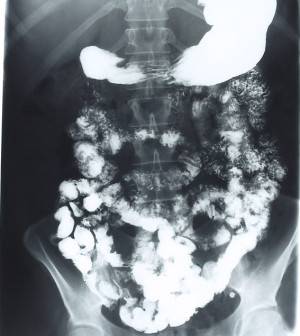- Could Your Grocery Store Meat Be Causing Recurring UTIs?
- Are You Making This Expensive Thermostat Error This Winter?
- Recognizing the Signs of Hypothyroidism
- 10 Strategies to Overcome Insomnia
- Could Artificial Sweeteners Be Aging the Brain Faster?
- Techniques for Soothing Your Nervous System
- Does the Water in Your House Smell Funny? Here’s Why
- Can a Daily Dose of Apple Cider Vinegar Actually Aid Weight Loss?
- 6 Health Beverages That Can Actually Spike Your Blood Sugar
- Treatment Options for Social Anxiety Disorder
Germs in Dog Poop Can Point to Bowel Trouble

A dog’s gut microbiome can reveal if it has inflammatory bowel disease (IBD), but this method of diagnosis is not possible in people, a new study says.
Gut microbiome refers to the varieties of germs in the digestive tract. IBD is a group of diseases that includes Crohn’s disease and ulcerative colitis.
Researchers from the University of California, San Diego, analyzed fecal samples from dogs with and without IBD and identified a pattern of gut microbes associated with IBD. Using this pattern, the researchers were more than 90 percent accurate in predicting which dogs did or did not have IBD.
But the researchers also concluded that the gut microbiomes of dogs and people aren’t similar enough to use dogs as models for people with IBD.
“One of the really frustrating things about IBD in humans is that it’s hard to diagnose — it usually requires intestinal biopsies, which are not only imperfect, but invasive and expensive to collect,” study senior author Rob Knight said in a university news release.
Compared to healthy people, most people with IBD have changes in the types of germs living in their intestinal tracts. But it is difficult to identify people with IBD just by examining fecal samples, Knight said.
And it’s not known if gut microbe patterns associated with IBD contribute to or are a result of the disease, Knight said. He is director of UC San Diego’s Center for Microbiome Innovation.
The study was published Oct. 3 in the journal Nature Microbiology.
People with IBD have chronic inflammation in the digestive tract that can cause pain, severe diarrhea and weight loss. It sometimes leads to life-threatening complications. More than 1 million Americans have IBD, according to the U.S. Centers for Disease Control and Prevention.
More information
The Crohn’s and Colitis Foundation of America has more on diagnosis and management of IBD.
Source: HealthDay
Copyright © 2026 HealthDay. All rights reserved.










